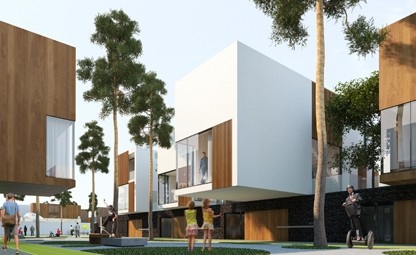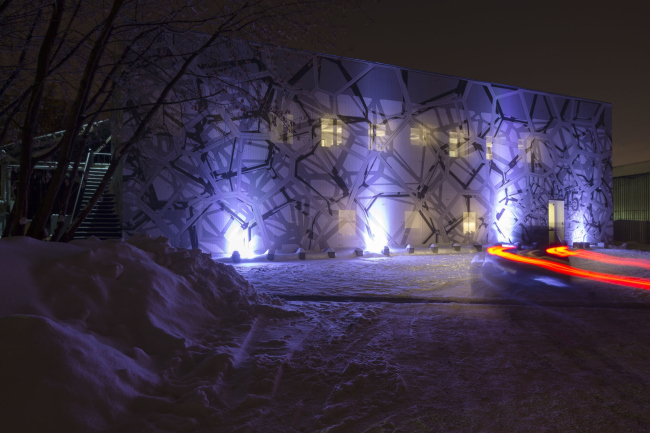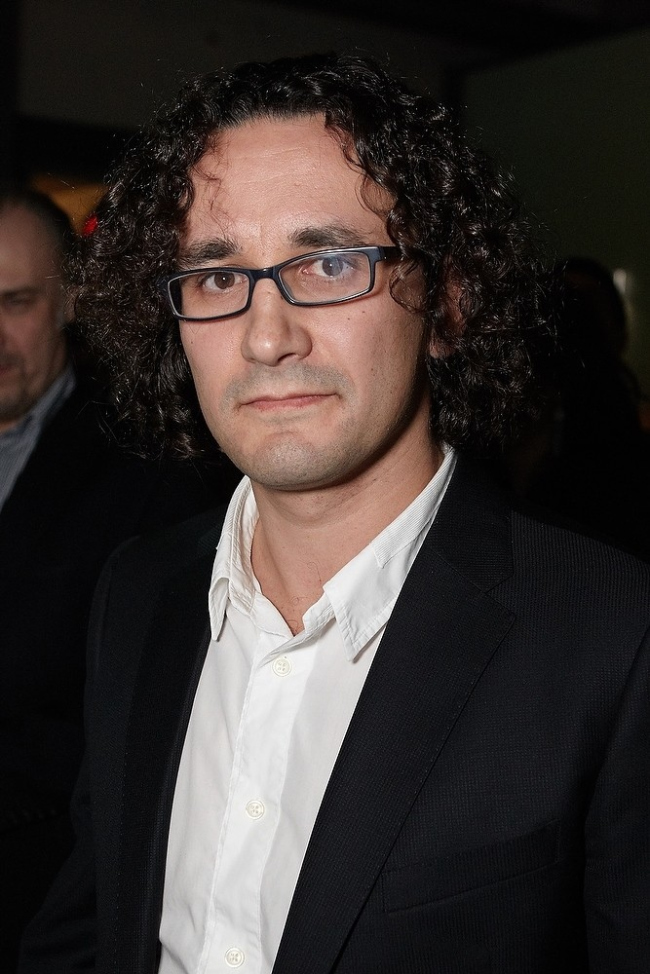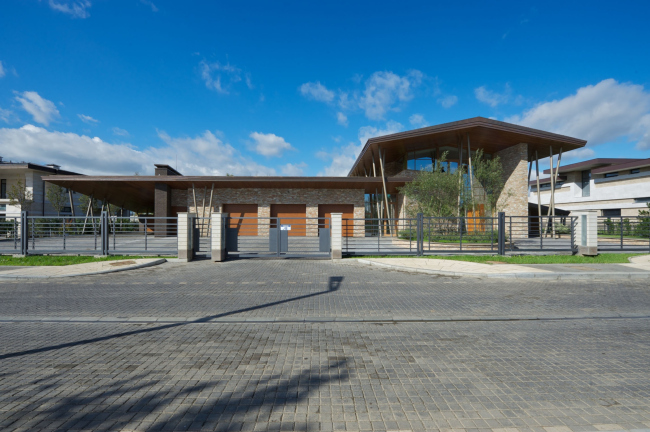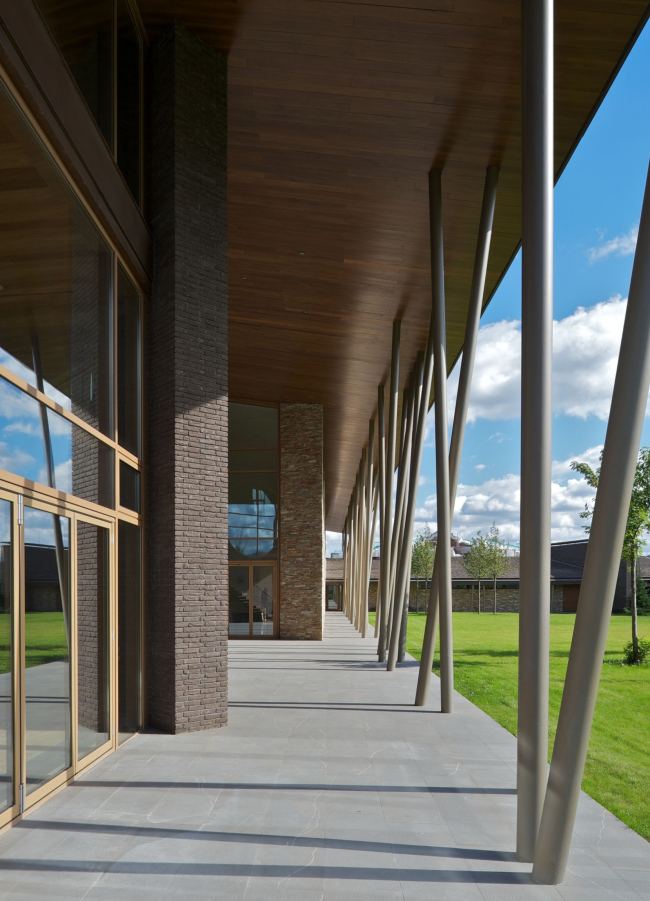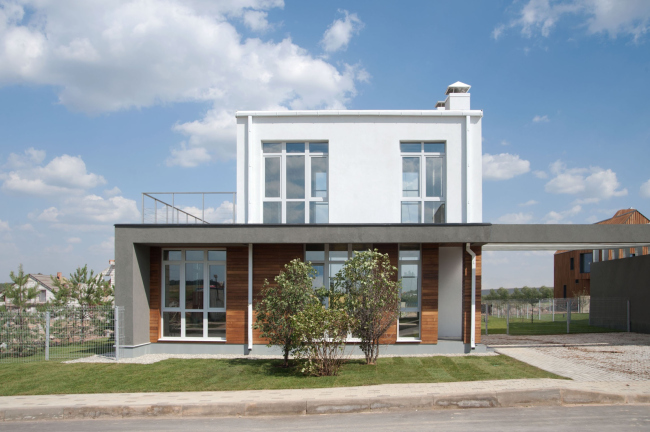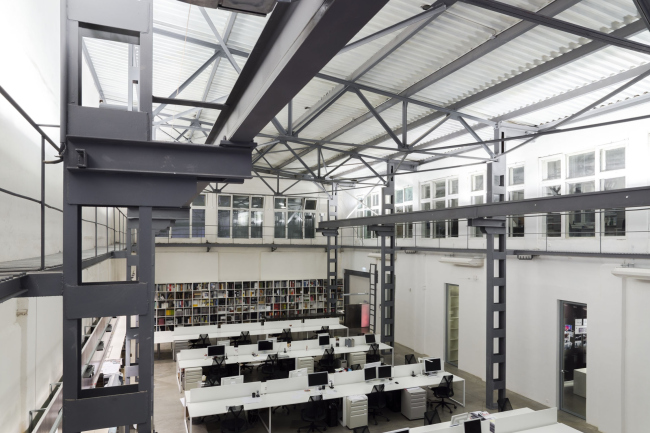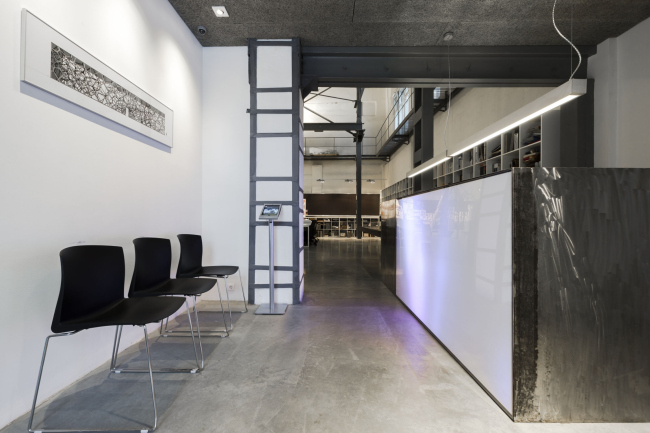|
"UNK Project" Bureau that celebrated its 15th birthday last year is the rare example of a Russian company that was organized and that operates according to the western model - operates successfully. Which fundamentals were borrowed by the Russian architects from their western colleagues and how the Russian architects were able to implement these fundamentals into the domestic practice - about this we are talking with one of the founders of the company, architect Julius Borisov.
Archi.ru: Julius, your company was
founded by three architects - you, Nikolai Milovidov, and Julia Tryaskina. When
I read your CV's the first thing that caught my eye was the fact that you all
have an experience of working in foreign companies, and in all the three cases
this is basically how you started your careers. Do I get it right that this
experience was crucial for you in the creation of a company of your own, that
you deliberately used the western model of organizing your architectural
business?
Julius Borisov: Yes, we did spend some of our
formative years in the West. Nikolai Milovidov used to work in a Swiss company
named "Fela Plannings AG", Julia Tryaskina - in the American company
NOK Architecture, and I myself graduated from Bauhaus, Dessau, and started my career
in Berlin's Smidt&Partners. While we were learning the basics of our
profession over there, here, in Moscow, the so-called "Luzhkov" style
was still blossoming which resulted in the wild surge of real estate prices,
the main criterion of the building quality being the very opportunity to get
all the necessary approvals to build your square footage. Regretfully - or
perhaps luckily - we were completely spared this experience. Quite the contrary
- one of the most fundamental things we leaned when working in western
companies was that the quality of your building can only be measured by a sum
total of its architectural, functional, and operational values. And we decided
that here we would work in exactly the same way. And, while all around us there
was the square-footage binge going on, what we did was work on smaller projects
where we could implement our principles. These were private little houses,
flats, office interiors, and retail spots. Now that the quality architecture is
gradually getting back into demand, we are starting to take on the objects of a
greater scale. 
UNK Project HQ 
Private house in the settlement of Zhukovka XXI Archi.ru: What do you mean by "quality
architecture"?
Julius Borisov: Quality architecture is
architecture that you are ultimately not ashamed of at the end of the day. The
kind that does not make you feel resentful, the kind that does not make you
want to immediately change something or at least make a correction. Quality -
it is when people use the building day by day and stop noticing that it is even
there. From the point of view of the end consumer, quality of architecture is
simply getting his money's worth.
Archi.ru: In other words, the functionality of the
designed project prevails over its form for you?
Julius Borisov: You cannot judge by this or that
property alone. In the best of the worlds, I think, the building should be
built in such a way that, in spite of the contemporary image and up-to-date
construction materials, it would look as if it had always stood there. A
different issue is that functionality is always opposed to the beauty of forms,
and if we speak about this dichotomy, then, yes, functionality is definitely
something that we put on top of everything else. The question of form and style
is really secondary; everything starts off from the specifications and the
givens, and everything is created with them in mind and for them. We are deeply
convinced that in any style you can do a great job and a really poor job. There
are plenty of examples of mediocre classics out there, just as there are of the
mediocre hi-tech. This is exactly why "UNK Project" does not have a
specific recognizable style; it is far more important for us to stick to our
initial principles of logic, rationality, and integrity of our projects. 
Private house in the settlement of Zhukovka XXI
Archi.ru: UNK Project won several industry awards
for the projects of office interiors, retail objects, and housing projects over
the last year alone. Does that mean that your company avoids not only stylistic
preferences but also preferences of some specific typology?
Julius Borisov: Our main specialty is human being.
In all of its various aspects: homo sapience, homo resting, homo working, homo
living. We had an experience of building an industrial object - we built a
plant of a very sophisticated structure but that was a single case. Generally,
we work with humans and for humans, designing housing projects, offices,
shopping malls, showrooms, and whole settlements. Lucky for us, the modern
humans prefer multifunctional space, so specializing in only one particular
technology is simply unnecessary.
Archi.ru: Among the three of you, the leading
architects of the bureau, are there any typology preferences?
Julius Borisov: Julia, as often is the case, is
responsible for the sectors of beauty and retail, Nikolai is a great expert in
offices, and I am more keen on the 3D design. This does not mean, though, that
each of us works strictly in one genre: our favorite method is synergy, and we
always share our experience with one another. This is why we do not have any
steady teams of architects - for each project, we form a dedicated author
collective. One thing remains the same though: we work each of our projects
down to the last detail - such keen attention to detail has become our habit
and at the same time our credo particularly because for a long time we mostly
worked with smaller projects. Each member of our team has acquired a wealth of
knowledge - figuratively speaking, somebody is a virtuoso designer of door
handles, somebody - of stained glass, and now this knowledge helps us work out
large scale projects in as much detail as possible, giving them individuality.
Archi.ru: Do you still work with small projects? They must
only be interesting to you as a testing ground of sorts for experimenting with
your new creative ideas?
Julius Borisov: Frankly speaking, I do not like
the term "testing ground". We don't make tests on our clients. When
we examine a new offer, we make all sorts of evaluations, including evaluating
it in terms of our self expression but the square footage never was the reason
why we agreed to do this or that particular project or turned it down. Yes, we
can take on a project with zero profit if we see interesting possibilities in
it. But regardless of whether we design a big project or a small one, we
inevitably keep up our commitment to excellence. 
Private house in the settlement of "Zapadnaya Dolina" ("Western Valley")
Archi.ru: Recently, you started, on a long-term
basis, working with the British architectural company Scott Brownrigg. What
does this partnership give you?
Julius Borisov: At some stage we realized that we
were lacking the knowledge of new building materials and modern technologies,
the advanced experience, if you will. So we made an agreement about the joint
work with our British partners. This partnership is a classic example of a
"win-win" deal - we learn to apply new technologies and techniques,
while our English colleagues now have the opportunity to work with greater
confidence in Russia and the CIS.
Archi.ru: Do I get it correct that now you invite
your British partners to work on almost all of your projects, and not only when
it is necessary, say, according to contest specifications, to come as an
international team?
Julius Borisov: Definitely. We invite our British
colleagues every time that we have a reason to think that their participation
in the project will bring about better results. Our clients readily agree with
us - the joint Russian/British project may come out a bit more expensive but
the end result, considering the terms, timing, construction expenses, and so
on, brings a far better return on investment. The excellently designed project
gives you the opportunity to save the operation costs later on - luckily, our
clients either know this from their own experience or are capable of listening
to our reasons. 
UNK Project HQ
Archi.ru: Generally, do you often take part in
bids and tenders?
Julius Borisov: We like closed tenders with clear
and unambiguous rules of the game and a guarantee of the seriousness of the
client's intentions. There are also such contests out there, participating in
which and winning which is our point of honor. For example, last year's open contest
for the "Technopark" housing project in Skolkovo. We feel so
confident in the field of low-rise construction, we are such experts in it that
we did not even need to be backed up by our western partners. Winning that
contest was for us a matter of principle. Which we did. Now the project is
starting to get implemented. 
UNK Project HQ
Archi.ru: What is the number of your employees?
Julius Borisov: Over 50.
Archi.ru: I deliberately asked for numbers because
a few years ago Julia in one of her interviews said that having an
architectural company with a staff of over 25 people is not really a nice idea
because things start to operate in an assembly line fashion...
Julius Borisov: We get more clients - we take in
more people. Late last year we even moved to a bigger office in order to
accommodate our growing staff. Our key values are still the same, though: we
only invite to work at UNK Project those people that are capable of coming up
with an original idea and an original concept. We are not running a Soviet-style
"project institute", we have an architectural office that is all
about mobility and creativity.
Archi.ru: As architects, how
comfortable are you working in the contemporary Moscow?
Julius Borisov: Well, you know, this is such an
ambiguous question... The poorer the quality of the city environment, the more
work there is for the architects - and in this sense, today's Moscow is very
comfortable. On the other hand, it is now that things are taking a turn for the
better, the chase of square meters is already history, and both the developers
and the city authorities are interested in the city getting quality and
comfortable architecture. At least on the level of lip service the
architectural authorities are trying to make it easier for the designers,
simplify the approval proceduresand so on. So, generally we do not grudge
working here and now.
Archi.ru: Your portfolio includes a large number
of projects developed for various regions of the Russian Federation...
Julius Borisov: Yes, we designed for Saint Petersburg,
Voronezh, Krasnoyarsk, and a number of other cities. Now there has formed a
certain trend: Moscow clients look for western or "pro-western"
architects, and the regional clients - for Moscow ones. Lucky for us, we feel
confident in either of the two sectors.
Archi.ru: Do you think it necessary to educate
your clients, develop their taste and thus help the quality architecture to
come into being?
Julius Borisov: This sure sounds like an honorable
mission, of course, but in real life it turns out that educating your clients
is often hard and not really rewarding... We are not an educational center,
after all. And we are not interested in clients that are only after their
square footage. They do not need us either. Basically, we work with commercial
organizations that are ready to invest in the long-term quality results. And,
interacting with them, we stand up for the solutions that we think are right
and sensible.
Archi.ru: How topical for you is the issue of the
construction quality? It is common opinion that in this country it ruins 90
percent of competent and sensible solutions...
Julius Borisov: As architects that work in Russia,
we, of course, are confronted with this issue now and then. Still, the way I
see it, very often the term "poor construction" is used to cover up
the poorly developed projects. Because we execute our projects on a highly
professional level, prepare the construction specification ourselves, and, not
lastly to our British partners, offer are clients the best possible building
materials, this guarantees the construction quality that is nothing but the
best. Although, yes - and here I will be totally honest with you - now and then
you have to spend colossal amounts of energy to convince your client to make a
choice in favor of the quality materials. But we know that it is all worth it. 
Contest project for Skolkovo None
None
None
None
None
None
None
None
|
